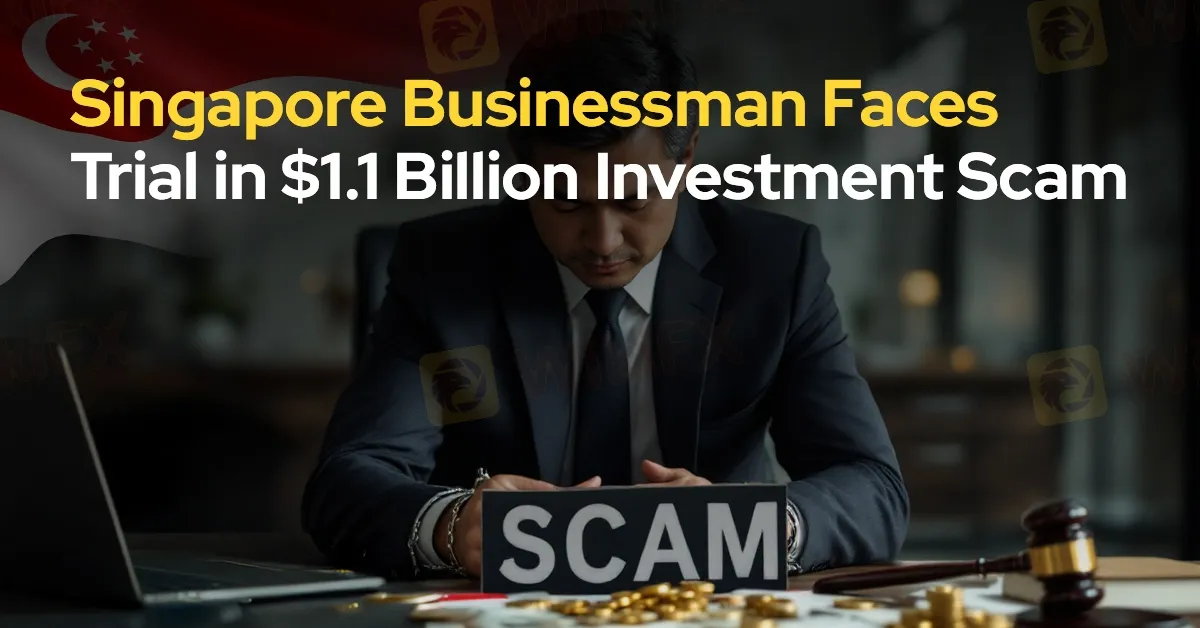简体中文
繁體中文
English
Pусский
日本語
ภาษาไทย
Tiếng Việt
Bahasa Indonesia
Español
हिन्दी
Filippiiniläinen
Français
Deutsch
Português
Türkçe
한국어
العربية
Singapore Businessman Faces Trial in $1.1 Billion Investment Scam
Abstract:A 37-year-old Singaporean businessman, Ng Yu Zhi, is currently on trial for allegedly orchestrating one of the largest investment frauds in the country's history. The scheme reportedly defrauded more than 900 investors of SGD1.5 billion (approximately US$1.1 billion) between 2016 and 2021.

A 37-year-old Singaporean businessman, Ng Yu Zhi, is currently on trial for allegedly orchestrating one of the largest investment frauds in the country's history. The scheme reportedly defrauded more than 900 investors of SGD1.5 billion (approximately US$1.1 billion) between 2016 and 2021.
According to prosecutors, Ng misled investors by promoting a fictitious nickel trading venture. He claimed to have secured a lucrative deal with a major Australian mining company to purchase nickel at a discounted rate. However, no such deal existed. Instead, Ng operated a Ponzi-like structure, using funds from new investors to pay earlier participants, creating an illusion of profitability.
Victims of the scam included prominent figures such as wealth fund managers, highlighting the scale and sophistication of the operation. Prosecutors revealed that Ng funnelled approximately SGD481 million—nearly one-third of the defrauded funds—into his extravagant lifestyle.

Luxury assets purchased with the misappropriated money included four high-end properties valued at SGD20 million and artworks worth SGD5 million. He also acquired several luxury vehicles, such as a Porsche 911 GT3, Rolls-Royce Phantom, Lamborghini Aventador SVJ, and an Aston Martin Rapide.
Authorities have charged Ng with 42 offences, including fraudulent trading, cheating, forgery, criminal breach of trust, and money laundering. He has pleaded not guilty to all charges.
The case underscores the growing problem of financial fraud in Singapore. According to a recent police report, the number of scam cases in the country rose by more than 16% year-on-year in the first half of 2024, reaching 26,587 incidents. These scams collectively caused losses exceeding SGD385.6 million.
Prosecutors described Ngs scheme as a well-crafted facade designed to deceive investors into believing in a profitable nickel trading enterprise. They emphasised that the supposed business was nothing more than a fabrication. The trial is expected to delve into the intricacies of the fraud, shedding light on how Ng managed to sustain the scheme for nearly five years.

Disclaimer:
The views in this article only represent the author's personal views, and do not constitute investment advice on this platform. This platform does not guarantee the accuracy, completeness and timeliness of the information in the article, and will not be liable for any loss caused by the use of or reliance on the information in the article.
Read more

The Hidden Checklist: Five Unconventional Steps to Vet Your Broker
Forex broker scams continue to evolve, employing new tactics to appear credible and mislead unsuspecting traders. Identifying these fraudulent schemes requires vigilance and strategies beyond the usual advice. Here are five effective methods to help traders assess the legitimacy of a forex broker and avoid potential pitfalls.

Doo Financial Obtains Licenses in BVI and Cayman Islands
Doo Financial, a subsidiary of Singapore-based Doo Group, has expanded its regulatory footprint by securing new offshore licenses from the British Virgin Islands Financial Services Commission (BVI FSC) and the Cayman Islands Monetary Authority (CIMA).

CFI’s New Initiative Aims to Promote Transparency in Trading
A new programme has been launched by CFI to address the growing need for transparency and awareness in online trading. Named “Trading Transparency+: Empowering Awareness and Clarity in Trading,” the initiative seeks to combat misinformation and equip individuals with resources to evaluate whether trading aligns with their financial goals and circumstances.

Malaysian-Thai Fraud Syndicate Dismantled, Millions in Losses Reported
The Royal Malaysia Police (PDRM) has received 26 reports concerning the Nicshare and CommonApps investment schemes, both linked to a major fraudulent syndicate led by a Malaysian citizen. The syndicate’s activities came to light following the arrest of its leader by Thai authorities on 16 December.
WikiFX Broker
Latest News
AIMS Broker Review
The Hidden Checklist: Five Unconventional Steps to Vet Your Broker
Russia to Fully Ban Crypto Mining in 10 Regions Starting January 1, 2025
YAMARKETS' Jingle Bells Christmas Offer!
Why is there so much exposure against PrimeX Capital?
MTrading’s 2025 "Welcome Bonus" is Here
Doo Financial Obtains Licenses in BVI and Cayman Islands
CFI’s New Initiative Aims to Promote Transparency in Trading
Currency Calculator



